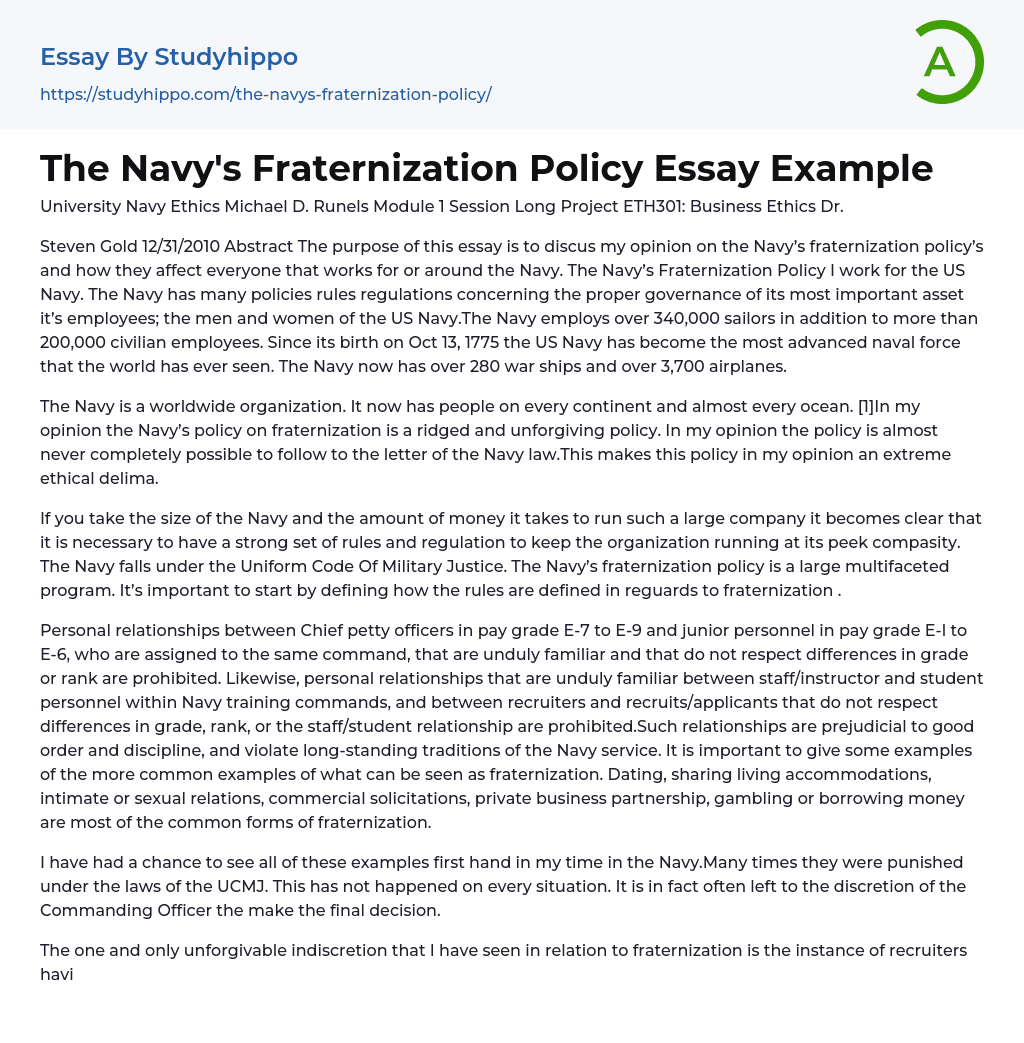

Business Ethics: The Navy’s Fraternization Policy Essay Example
The purpose of this essay is to discus my opinion on the Navy’s fraternization policy’s and how they affect everyone that works for or around the Navy. The Navy’s Fraternization Policy I work for the US Navy. The Navy has many policies rules regulations concerning the proper governance of its most important asset it’s employees; the men and women of the US Navy.The Navy employs over 340,000 sailors in addition to more than 200,000 civilian employees. Since its birth on Oct 13, 1775 the US Navy has become the most advanced naval force that the world has ever seen. The Navy now has over 280 war ships and over 3,700 airplanes.
The Navy is a worldwide organization. It now has people on every continent and almost every ocean. [1]In my opinion the Navy’s policy on fraternization is a
...ridged and unforgiving policy. In my opinion the policy is almost never completely possible to follow to the letter of the Navy law.This makes this policy in my opinion an extreme ethical delima.
If you take the size of the Navy and the amount of money it takes to run such a large company it becomes clear that it is necessary to have a strong set of rules and regulation to keep the organization running at its peek compasity. The Navy falls under the Uniform Code Of Military Justice. The Navy’s fraternization policy is a large multifaceted program. It’s important to start by defining how the rules are defined in reguards to fraternization .
Personal relationships between Chief petty officers in pay grade E-7 to E-9 and junior personnel in pay grade E-l to E-6, who are assigned to th
same command, that are unduly familiar and that do not respect differences in grade or rank are prohibited. Likewise, personal relationships that are unduly familiar between staff/instructor and student personnel within Navy training commands, and between recruiters and recruits/applicants that do not respect differences in grade, rank, or the staff/student relationship are prohibited.
Such relationships are prejudicial to good order and discipline, and violate long-standing traditions of the Navy service. It is important to give some examples of the more common examples of what can be seen as fraternization. Dating, sharing living accommodations, intimate or sexual relations, commercial solicitations, private business partnership, gambling or borrowing money are most of the common forms of fraternization.
I have had a chance to see all of these examples first hand in my time in the Navy.Many times they were punished under the laws of the UCMJ. This has not happened on every situation. It is in fact often left to the discretion of the Commanding Officer the make the final decision.
The one and only unforgivable indiscretion that I have seen in relation to fraternization is the instance of recruiters having sexual relationships with recruits. This one situation is always punished to the fullest extent of what is allowed by the Navy.In conclusion my opinion is that the Navy needs to have a policy to govern inaproprate relationships between recruits and recruiters as well as student to instructor and supervisor to subordinate. This would be enough of a restriction on relationships in the Navy.
- Federal government essays
- Armed Forces essays
- Confederate States Of America essays
- Federal Government Of The United States essays
- Fourteenth Amendment To The United States Constitution essays
- Governance essays
- Parliament essays
- Politics essays
- Jurisdiction essays
- Bureaucracy essays
- Separation Of Powers essays
- Congress essays
- President essays
- United States Congress essays
- Non-Commissioned Officer essays
- Appeal essays
- Revenge essays
- Corporate Governance essays
- Public Service essays
- Income Tax essays
- Supply essays
- Red Cross essays
- Democracy essays
- State essays
- Liberty essays
- Absolutism essays
- Reform essays
- Republic essays
- John Marshall essays
- Bourgeoisie essays
- Developed Country essays
- Elections essays
- International Relations essays
- Left-Wing Politics essays
- Monarchy essays
- Political Corruption essays
- Political Party essays
- Political Science essays
- Sovereign State essays
- United Nations essays
- World Trade Organization essays
- Contras essays
- Dictatorship essays
- Foreign policy essays
- Monarch essays
- Corruption essays
- Foreign essays
- Democratic Party essays
- European Union essays
- President Of The United States essays



